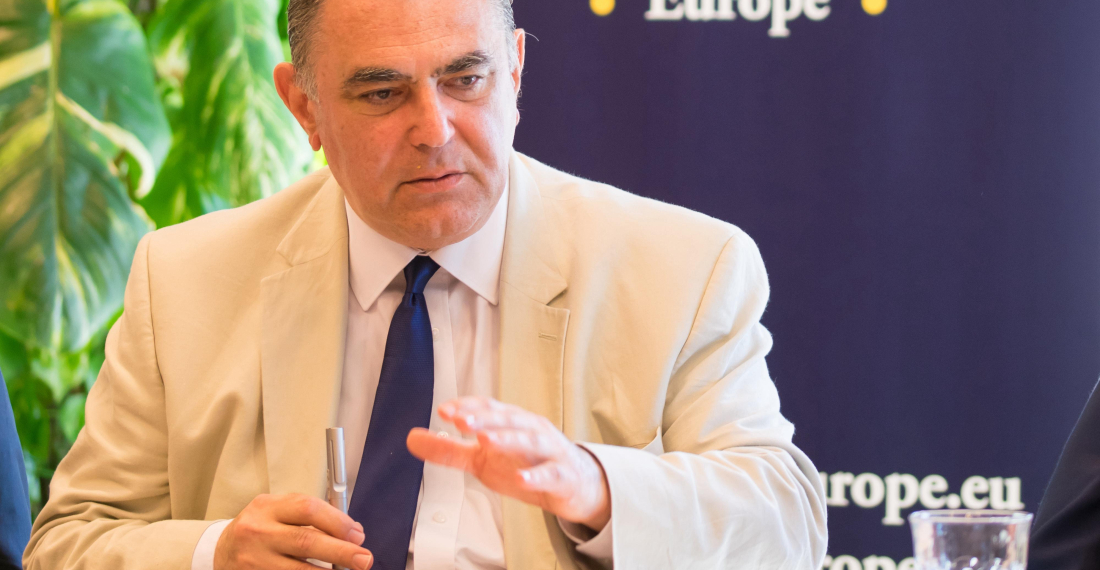LINKS Europe has just launched its campaign Landmine Free South Caucasus 2025. South Caucasus Landmine Observer, in its issue on 1st September 2025 asked Dr Dennis Sammut, Executive Director of LINKS Europe why having this regional campaign was important. We republish here the interview:
Question: LINKS Europe has just launched the regional campaign Landmine Free South Caucasus 2025 (LFSC2025). This is the fourth campaign in six years. Why is the campaign important?
The problem of land and environmental contamination by landmines and other remnants of war is acute in the South Caucasus. Not all countries are in the same position. In Georgia, there has been a lot of work done, but there are still problems, you only need to go near the Red Bridge to understand that; in Armenia, there is a serious problem; and in Azerbaijan, the problem is very serious indeed. Because the problem does not affect the capitals, many people are either not aware of the problem, or frankly, they don’t care.
Our first task is to inform and raise awareness, including on the plight of victims, their families and their communities. The second task is to help mobilise societies in the three countries in favour of mine action. The third task is to engage with the governments of the three countries. Of course, in principle, all three countries want to clear landmines and other remnants of war, but when it comes to details, it becomes a different story.
LFSC 2025, and the three campaigns before it, are regional efforts, conducted simultaneously in the three countries and where possible in five languages: Armenian, Azerbaijani, Georgian, Russian and English. We need to convince decision makers and opinion-shapers that a regional approach is necessary and more effective. Doing this between 2018-2024 was very difficult because of the Armenia-Azerbaijan enmity. Now both countries have committed to peace, and that offers some new opportunities.
Question: How will the campaign this year be different?
In 2023/24, we held a consultation process and listened to a lot of people. There were many ideas, but two were central: first, everyone thought having the campaign was a useful thing, and secondly, people wanted to see more local involvement. There were many other interesting ideas. We tried to incorporate many of these in our plans for LFSC2025
The campaign this year will be in two parts: The first part, from 1 September to 15 November, will be largely informative, using media and social media, whilst engaging with decision makers and civil society in the three countries.
In the second part of the campaign, from 15 November to 15 December, the focus this year will be on the human and economic costs of landmine contamination. The Campaign will again mark 30 November as the Day of Solidarity with the victims of landmines and other remnants of war in the South Caucasus.
We want local civil society to take the lead, particularly in the second half of the campaign. The Campaign Appeal will also be issued on 15 November, and we want local civil society organisations to be prominent in its preparation and dissemination.
Question: Who is helping you to organise LFSC 2025?
LINKS Europe has no wish to monopolise the process, especially since we are not a mine clearance organisation, and in 2023/24, we held several meetings with international NGOs to try to see who can take over our co-ordination role. But this is a difficult, and often, thankless, task. So none wanted the responsibility. Rather than stop the work, we decided to continue.
The first three campaigns were supported by the European Union. LFSC 2025 is not. The EU supports one other LINKS Europe project in the South Caucasus, for which we are grateful. But we think it is a mistake for the EU not to support the regional landmine campaign.
Regardless of these difficulties, given the enthusiasm we already feel from local partners, I am sure that LFSC 2025 will be a success and will meet its objectives.
Question: What are you trying to achieve with LFSC 2025, and specifically, is convincing Armenia, Azerbaijan and Georgia to join the Ottawa Convention one of these objectives?
I told you already what we are trying to achieve with LFSC2025. Of course, we would like the governments of Armenia, Azerbaijan and Georgie to sign the Ottawa Convention that bans anti-personnel landmines. I have discussed this with officials of the three countries on several occasions over the last six years, and in all three countries, I was told that the door on this issue is not closed. But the three countries have borders with third countries. Two of them are Russia and Iran, which have not signed the Ottawa Convention. Russia has planted hundreds of thousands of landmines in Ukraine. This has led five NATO countries and Ukraine to abandon the Ottawa Convention. So we are not expecting Armenia, Azerbaijan and Georgie to sign the Ottawa Convention soon, although I strongly believe it is in their interest to do so. The Campaign, however, offers a good opportunity to continue the conversation.
That does not mean that nothing can happen. Armenia, Azerbaijan and Georgia can agree on landmine-free zones, where landmine clearance can take place, and mutual supervision can ensure compliance. This can be one of the confidence-building measures between the three countries. We hope to develop this idea in the course of LFSC 2025.







